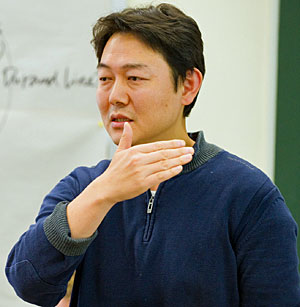SIT professor promotes reconciliation in East Asia
February 28th, 2017 | SIT Graduate Institute

SIT Peacebuilding and Conflict Resolution Professor Tatsushi Arai spoke Aug. 8 at a public forum in Tokyo on China-Japan relations. The event was organized by the Sasakawa Peace Foundation, a Japanese thought leader in the field. Professor Arai’s address, “On the applied practice of conflict transformation and historical reconciliation in Sino-Japan relations,” examined the sources of the two countries’ territorial dispute in the East China Sea and offered policy proposals including the need to revive negotiations in earnest for joint natural resource development in the disputed area.
Appearing side by side with his long-term Chinese colleague, Professor Zheng Wang, director of Seton Hall University’s Center for Peace and Conflict Studies, Professor Arai, a native of Japan, engaged a roomful of mostly Japanese participants including journalists, civil society leaders, policy scholars, and opinion leaders in a lively exchange of views. The two professors’ talks built on the their ongoing collaboration, which has resulted in such publications as Clash of National Identities: China, Japan, and the East China Sea Territorial Dispute.
Earlier, on August 5, Professors Arai and Wang, along with Professor Yang Daqing of the George Washington University, led a workshop on the resolution of East Asia’s territorial disputes at Waseda University in Tokyo. Sponsored by the Hong Kong-based Bai Xian Asia Institute, the workshop brought together some 130 university students and young scholars from Japan, Korea, China, and other parts of the world. The workshop sought to orchestrate a highly interactive process of dialogue and reflection in which the participants examined the obstacles to East Asia's historical reconciliation and explore ways to promote peaceful coexistence.
Both events took place against the backdrop of rising tension between Beijing and Tokyo over the East China Sea. Recently, the tension has deepened due in part to the highly interconnected nature of the international dispute over the South China Sea and security concerns over the Korean Peninsula.
The partnership between Professors Arai and Wang, former classmates from George Mason University’s doctoral program, has proved invaluable as the rising tension in China-Japan relations calls for Chinese-Japanese collaboration capable of transcending the two countries’ differences.
